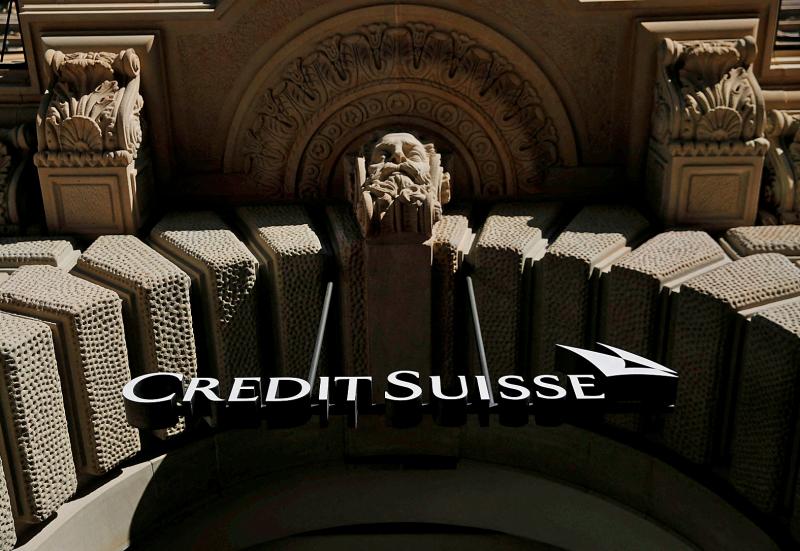Credit Suisse Group AG was convicted of failing to prevent money laundering by a Bulgarian cocaine trafficker, in the first ever criminal conviction of a major Swiss lender in the country’s history.
The verdict, in which a former relationship manager at the bank was also convicted on money laundering charges, was handed down by Switzerland’s top criminal court yesterday.
The woman was given a 20-month suspended prison sentence while Credit Suisse faces a fine of 2 million Swiss francs (US$2.08 million) and was also hit with a claim of SF19 million, equivalent to the amount the bank allowed to be laundered.

Photo: Reuters
The judgement is another blow to the tarnished reputation of Credit Suisse, which said the crimes date to an era when compliance standards were less stringent. It has been struggling with a series of scandals that have sent its shares to near-record lows, and could face a second criminal indictment in an unrelated case later this year.
The bank said in a statement it would appeal the decision, noting that the pretrial investigation dates back more than 14 years.
“Credit Suisse is continuously testing its anti-money laundering framework and has been strengthening it over time, in accordance with evolving regulatory standards,” the bank said.
The former Credit Suisse manager, who can only be named as “E” under Swiss reporting restrictions, accepted deposits of used bank notes that regularly exceeded 500,000 euro (US$529,155) at a time, according to the 515-page indictment.
Cash deposits were common given the parlous state of Bulgaria’s banks at the time, she said in testimony.
Two other Bulgarians were convicted in the case for participation in a criminal organization and aggravated money laundering. One was given a 36-month prison sentence, with 18 months suspended, and the other was handed a 12-month suspended sentence.
The main Bulgarian at the heart of the scandal, who was later handed a 20-year sentence for his drug offenses, organized the importation of tens of tonnes of cocaine into Europe between 2002 and 2012, using boats, planes and drug traffickers willing to swallow cocaine-packed rubber balls.

BYPASSING CHINA TARIFFS: In the first five months of this year, Foxconn sent US$4.4bn of iPhones to the US from India, compared with US$3.7bn in the whole of last year Nearly all the iPhones exported by Foxconn Technology Group (富士康科技集團) from India went to the US between March and last month, customs data showed, far above last year’s average of 50 percent and a clear sign of Apple Inc’s efforts to bypass high US tariffs imposed on China. The numbers, being reported by Reuters for the first time, show that Apple has realigned its India exports to almost exclusively serve the US market, when previously the devices were more widely distributed to nations including the Netherlands and the Czech Republic. During March to last month, Foxconn, known as Hon Hai Precision Industry

Taiwan Semiconductor Manufacturing Co (TSMC, 台積電) and the University of Tokyo (UTokyo) yesterday announced the launch of the TSMC-UTokyo Lab to promote advanced semiconductor research, education and talent development. The lab is TSMC’s first laboratory collaboration with a university outside Taiwan, the company said in a statement. The lab would leverage “the extensive knowledge, experience, and creativity” of both institutions, the company said. It is located in the Asano Section of UTokyo’s Hongo, Tokyo, campus and would be managed by UTokyo faculty, guided by directors from UTokyo and TSMC, the company said. TSMC began working with UTokyo in 2019, resulting in 21 research projects,

Ashton Hall’s morning routine involves dunking his head in iced Saratoga Spring Water. For the company that sells the bottled water — Hall’s brand of choice for drinking, brushing his teeth and submerging himself — that is fantastic news. “We’re so thankful to this incredible fitness influencer called Ashton Hall,” Saratoga owner Primo Brands Corp’s CEO Robbert Rietbroek said on an earnings call after Hall’s morning routine video went viral. “He really helped put our brand on the map.” Primo Brands, which was not affiliated with Hall when he made his video, is among the increasing number of companies benefiting from influencer

Quanta Computer Inc (廣達) chairman Barry Lam (林百里) yesterday expressed a downbeat view about the prospects of humanoid robots, given high manufacturing costs and a lack of target customers. Despite rising demand and high expectations for humanoid robots, high research-and-development costs and uncertain profitability remain major concerns, Lam told reporters following the company’s annual shareholders’ meeting in Taoyuan. “Since it seems a bit unworthy to use such high-cost robots to do household chores, I believe robots designed for specific purposes would be more valuable and present a better business opportunity,” Lam said Instead of investing in humanoid robots, Quanta has opted to invest